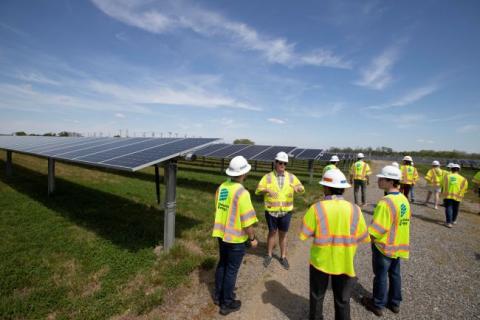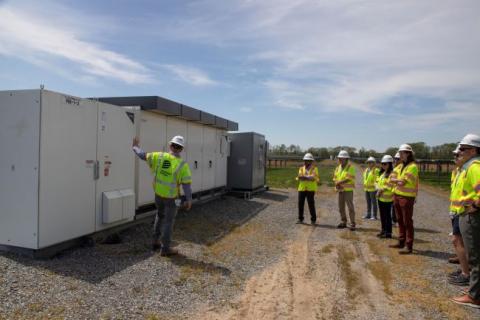
A partnership between UVA and Dominion Energy results in green energy for all electricity consumption at the Darden School of Business.
This past Earth Day, several folks from UVA took the opportunity to expand their knowledge of renewable energy and how it is helping the University meet its Sustainability goals. Members of the Darden Energy Club, joined by Darden professors Mike Lenox and Carolyn Miles, and members of the UVA Energy & Utilities and Sustainability teams visited Dominion Energy’s Hollyfield Solar Farm.
Hollyfield accounts for all of Darden’s electricity consumption and at full capacity has enough solar panels – 65,000 – to power about 4,250 homes. The facility, which went online in 2018, has allowed Darden to decarbonize its power through renewable energy, avoiding 17,000 metric tons of carbon dioxide emissions each year.
Our group arrived at the 160-acre solar farm, located in King William County northeast of Richmond, in sustainable style – driving two electric vehicles and a hybrid minivan. At the 17-megawatt facility, we learned that it was constructed to send direct current (DC) voltage to inverter stations that turn the DC into the alternating current (AC) needed to go to the nearby power lines.
We witnessed how the solar panels adjust every 15 minutes to better face the sun and generate more electricity. Dominion even uses a GPS and an artificial intelligence algorithm to tell each individual panel the degree to which to tilt at any given point in the day. Lastly, we heard about Dominion’s exciting plans to conduct battery storage pilots so that even at night or on cloudy days, its solar projects can supply clean energy to the grid
Hollyfield doesn’t directly supply Darden’s electricity; rather the project was set up between UVA and Dominion under what’s called a virtual power purchase agreement (VPPA). The facility generates sufficient power for Darden’s needs, and Darden has agreed to pay a fixed price (called an off-take price) to Dominion per kilowatt-hour. But instead of sending the electricity nearly 100 miles to Grounds, Dominion sells the energy onto the grid at a market-driven wholesale price. So although Darden doesn’t use the literal electrons generated at Hollyfield, the solar energy is displacing electricity on the regional grid that would otherwise likely be sourced from fossil fuels. Thus, under the VPPA, Darden can claim renewable energy use and other benefits.
There are a number of advantages of a VPPA for Darden. The school doesn’t have to build a solar plant closer to Grounds to directly supply electricity, or configure a back-up source of energy when the sun isn’t shining. This would take longer than developing the the contract with Dominion for the Hollyfield plant. Also, the agreed-upon fixed price is a great price hedge and gives Darden cost predictability. If energy prices in Virginia rise, Darden will pay more for the electricity that moves through its buildings, but Dominion will reimburse Darden the difference between the higher price and the fixed price. In exchange, Dominion secures a monetary promise from Darden that it can use to finance its development of the project.
The Hollyfield Solar Farm was a sight to see on a beautiful Friday afternoon and the group is thankful for the Dominion team’s willingness to host our tour and teach us about the plant’s role in decarbonizing Darden’s electricity use.

Gaston Quantz is a member of the Darden School of Business’s Class of 2023, concentrating in Finance and Sustainability. He is spending his summer interning at Apex Clean Energy and looks forward to more involvement with the Energy Club next year as the VP of Communications and Outreach.


